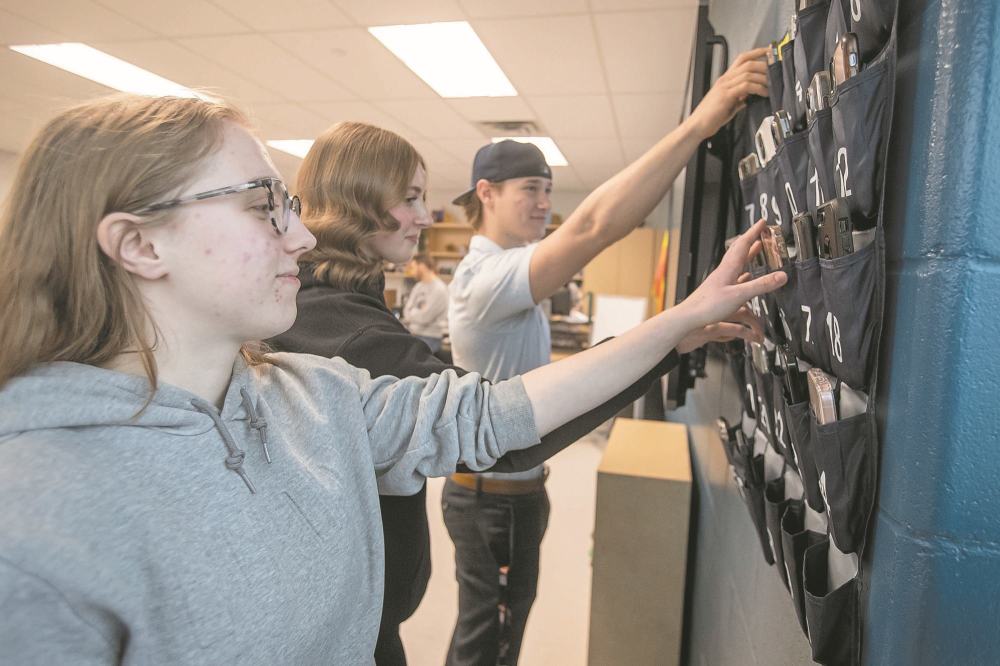A group of tech-savvy teachers is calling on the province to create guidelines on cellphone use in schools and offering to help get it done.
The Manitoba Association of Education Technology Leaders has taken a firm stance against introducing a sweeping ban of personal wireless devices in kindergarten-to-Grade 12 buildings.
Manitoba Education has no policy in place. School divisions create their own appropriate use policies, while most buildings allow teachers to make rules for their own classrooms.
Tuxedo’s Laidlaw School, Collège Béliveau in Windsor Park and West Kildonan Collegiate are among Winnipeg facilities that have imposed stricter measures this year.
“Black-and-white policies don’t serve everybody, whereas open guidelines can provide educators the professional authority and autonomy to know their students best and make their decisions (accordingly),” said Kirsten Thompson, president of MAETL.
“Black-and-white policies don’t serve everybody, whereas open guidelines can provide educators the professional authority and autonomy to know their students best and make their decisions (accordingly).”–Kirsten Thompson
The group, made up of educators and IT professionals in school divisions across the province, raised the issue in a letter to Premier Wab Kinew and the ministers of Education and Families this week.
MAETL is recommending guidelines that position classrooms as places where students learn how to use devices “efficiently and responsibly,” allow flexibility among grade levels, communities and individuals and include ideas to help teachers leverage the guidelines to meet educational goals.
The letter, dated Monday, states such a document should acknowledge the key role that electronics play in “fostering personal management, accessibility and equity within the scope of educational programming.”

New rules in Manitoba’s francophone school division, as well as Quebec and B.C., have renewed the debate during the current academic year over whether students should be allowed to use phones during instructional time — be it for doing research, keeping in contact with parents or for other purposes.
Since the start of the school year, Division scolaire franco-manitobaine has not allowed students to have phones with them during class time. Texting, scrolling social media and listening to music are all off-limits in an effort to reduce distractions.
“It’s never easy to implement something that’s that big, but at the same time we are an institution of pedagogy and kids are learning and unless you use your phone as a research tool or computer — and we already have computers in our classes — why do we need a cellphone?” said Alain Laberge, the division’s superintendent.
The measure was fuelled by concerns about excessive screen time and research showing it increases anxiety levels and has other negative mental-health effects on youth, Laberge said, adding the division intends to undertake qualitative research in the summer to assess the policy’s early impact.
After the winter break, Quebec began prohibiting students from using phones in classrooms. And education officials in B.C. announced recently that strict rules will go into effect in September in a bid to limit distractions for both students and teachers.
Ontario introduced a universal ban in 2019 with individual teachers responsible for enforcement; as a result, there has been a patchwork of compliance.
Thompson said universal rules go against the necessary individualization and differentiation built into classrooms.
“We have a ban on handguns. We have a ban on vaping. None of those things can enter our schools; there is no wiggle room,” said the information and communications technology co-ordinator.
She said there should, however, be flexibility for teachers to incorporate phones into programming based on their professional discretion.
The MAETL spokeswoman noted that many students spent the better part of three formative years being asked to engage in online learning due to COVID-19. Completely changing course now sends “a weird, mixed message.”
Teachers must adapt to educating students growing up in an increasingly tech-savvy society and they need support doing so, she added.
Roughly 77 per cent of youth between the ages of nine and 17 have their own smartphone, according to a 2021 survey conducted by MediaSmarts, a charity dedicated to promoting digital and media literacy in Canada.
MAETL members are expected to discuss draft phone use guidelines for K-4, middle years and high school levels at a meeting in Portage next week.
Education Minister Nello Altomare’s office confirmed receipt of the association’s pitch to collaborate on a new document.
Cabinet communications director Amy Tuckett-McGimpsey indicated internal discussions have just begun to decide how best to tackle concerns about phones being a distraction in classrooms.
While saying it’s too early to weigh in on the issue, she hinted an announcement will be made in the coming weeks.
maggie.macintosh@freepress.mb.ca









